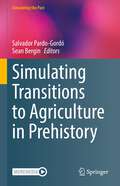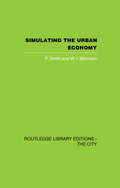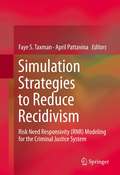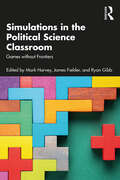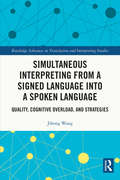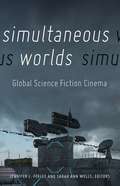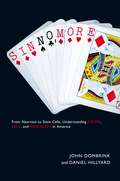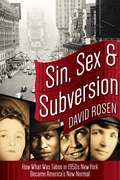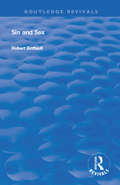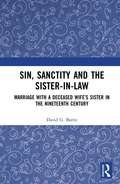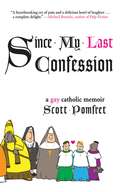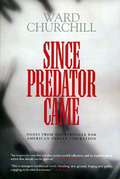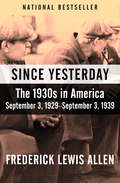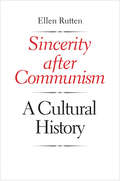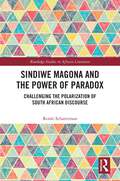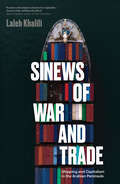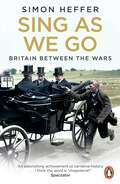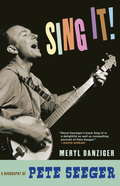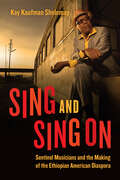- Table View
- List View
Simulating Transitions to Agriculture in Prehistory (Computational Social Sciences)
by Salvador Pardo-Gordó Sean BerginThis book highlights new and innovative approaches to archaeological research using computational modeling while focusing on the Neolithic transition around the world.The transformative effect of the spread and adoption of agriculture in prehistory cannot be overstated. Consequently, archaeologists have often focused their research on this transition, hoping to understand both the ecological causes and impacts of this shift, as well as the social motivations and constraints involved. Given the complex interplay of socio-ecological factors, the answers to these types of questions cannot be found using traditional archaeological methods alone. Computational modeling techniques have emerged as an effective approach for better understanding prehistoric data sets and the linkages between social and ecological factors at play during periods of subsistence change. Such techniques include agent-based modeling, Bayesian modeling, GIS modeling of the prehistoric environment, and the modeling of small-scale agriculture. As more archaeological data sets aggregate regarding the transition to agriculture, researchers are often left with few ways to relate these sets to one another.Computational modeling techniques such as those described above represent a critical next step in providing archaeological analyses that are important for understanding human prehistory around the world. Given its scope, this book will appeal to the many interdisciplinary scientists and researchers whose work involves archaeology and computational social science.
Simulating the Urban Economy: Experiments with input-output techniques
by P. Smith W. I. MorrisonThis book was first published in it's current form in 1974.
Simulation Strategies to Reduce Recidivism
by Faye S. Taxman April PattavinaThe use of simulation modeling in criminal justice dates back to the 1970s. Early models were developed to capture the realities of the criminal justice system, to identify what changes were needed, and how small changes would affect the overall picture. Significant time and effort were devoted to these projects and although they achieved some success, the complex nature of the criminal justice system and the difficulties associated with improving and maintaining the models prohibited wide spread adoption in the field. Some of the problems with early simulation projects were the lack of data to validate models, the lack of technical skills needed by staff to design and build the models, and the technical difficulties with software programming to transform models into computerized representations. As simulation modeling has becoming a more popular technique across many disciplines, and technology as well as the technical skills of researchers has improved, this book revisits the concept of simulation modeling with new applications for the criminal justice system. The wider availability of data has made for more opportunity to verify and validate models; computing software has become more available and easier to use; and the capacity for visualization and communication of models shows promise for the future of simulation in criminal justice. The time has come to examine the past, present, and future contributions of simulation modeling to the field of criminal justice. This work provides a central resource of information for the current state of simulation modeling, and overview of existing techniques and cases of success, and directions for future development. This work will be an important resource for researchers in criminal justice and related fields, as well as those studying policy-related topics.
Simulations in the Political Science Classroom: Games without Frontiers
by Mark HarveyThis book is premised on the assumption that games and simulations provide welcome alternatives and supplements to traditional lectures and class discussions—especially in political science classrooms, where real-world circumstances provide ideal applications of theory and policy prescriptions. Implementing such an active learning program, however, is sometimes daunting to overburdened professors and teaching assistants. This book addresses the challenges of using games and simulations in the political science classroom, both online and in person. Each chapter offers a game or simulation that politics teachers can use to teach course concepts and explains ways to execute it effectively. In addition, the authors in this volume make a proactive case for games and simulations. Each chapter offers research to evaluate the effectiveness of the activity and pedagogical design best practices. Thus, the book not only serves as a game design resource, but also offers demonstrable support for using games and simulations in the political science classroom. Aimed at teachers at all levels, from high school through college, the book may be especially appealing to graduate students entering teaching for the first time and open to new teaching and learning approaches.
Simulations in the Political Science Classroom: Games without Frontiers
by Mark HarveyThis book is premised on the assumption that games and simulations provide welcome alternatives and supplements to traditional lectures and class discussions—especially in political science classrooms, where real-world circumstances provide ideal applications of theory and policy prescriptions. Implementing such an active learning program, however, is sometimes daunting to overburdened professors and teaching assistants. This book addresses the challenges of using games and simulations in the political science classroom, both online and in person. Each chapter offers a game or simulation that politics teachers can use to teach course concepts and explains ways to execute it effectively. In addition, the authors in this volume make a proactive case for games and simulations. Each chapter offers research to evaluate the effectiveness of the activity and pedagogical design best practices. Thus, the book not only serves as a game design resource, but also offers demonstrable support for using games and simulations in the political science classroom. Aimed at teachers at all levels, from high school through college, the book may be especially appealing to graduate students entering teaching for the first time and open to new teaching and learning approaches.
Simultaneous Interpreting from a Signed Language into a Spoken Language: Quality, Cognitive Overload, and Strategies (Routledge Advances in Translation and Interpreting Studies)
by Jihong WangThis book examines conference-level simultaneous interpreting from a signed language into a spoken language, drawing on Auslan (Australian Sign Language)-to-English simultaneous interpretation data to explore the skills, knowledge, strategies, and cognitive abilities needed for effective interpretations in this language direction. As simultaneous interpreting from a spoken language into a signed language is the widely accepted norm within the field of signed language interpreting, to date little has been written on simultaneous interpreting in the other language direction. In an attempt to bridge this gap, Wang conducts microanalysis of an experimental corpus of Auslan-to-English simultaneous interpretations in a mock conference setting to investigate different dimensions of quality assessment, interpreting strategies, cognitive load, and the interpreting process itself. The focus on conference-level simultaneous interpreting not only allows for insights into the impact of signed language variation on the signed-to-spoken language simultaneous interpreting process but also sheds light on the unique demands of conference settings such as the requirement of using a formal register. Acting as a bridge between spoken language interpreting studies and signed language interpreting studies and highlighting implications for future research on simultaneous interpreting of other language combinations (spoken and signed), this book will be of interest to scholars in translation and interpreting studies as well as active practitioners in these fields.
Simultaneous Worlds: Global Science Fiction Cinema
by Jennifer L. Feeley Sarah Ann WellsSince the 1927 release of Fritz Lang&’s pioneer film Metropolis, science fiction cinema has largely been regarded a Western genre. In Simultaneous Worlds, Jennifer L. Feeley and Sarah Ann Wells showcase authors who challenge this notion by focusing on cinemas and cultures, from Cuba to North Korea, not traditionally associated with science fiction. This collection introduces films about a metal-eating monster who helps peasants overthrow an exploitative court, an inflatable sex doll who comes to life, a desert planet where matchsticks are more valuable than money, and more.Simultaneous Worlds is the first volume to bring a transnational, interdisciplinary lens to science fiction cinema. Encountering some of the best emerging and established voices in the field, readers will become immersed in discussions of well-known works such as the Ghost in the Shell franchise and Neill Blomkamp&’s District 9 alongside lesser-known but equally fascinating works by African, Asian, European, and South American filmmakers. Divided into five parts that cover theoretical concerns such as new media economies, translation, the Global South, cyborgs, and socialist and postsocialist cinema, these essays trace cinema&’s role in imagining global communities and power struggles.Considering both individual films and the broader networks of production, distribution, and exhibition, Simultaneous Worlds illustrates how film industries across the globe take part in visualizing the perils of globalization and technological modernity. Ultimately, this book opens new ways of thinking about world cinema and our understanding of the world at large.
Sin No More: From Abortion to Stem Cells, Understanding Crime, Law, and Morality in America
by John Dombrink Daniel HillyardRead the Authors' Op-Ed on the Seattle Post-IntelligencerSin No More offers a vivid examination of some of the most morally and politically disputed issues of our time: abortion, gay rights, assisted suicide, stem cell research, and legalized gambling. These are moral values issues, all of which are hotly, sometimes violently, contested in America. The authors cover these issues in depth, looking at the nature of efforts to initiate reforms, to define constituencies, to mobilize resources, to frame debates, and to shape public opinion—all in an effort to achieve social change, create, or re-write legislation. Of the issues under scrutiny only legalized gambling has managed to achieve widespread acceptance despite moral qualms from some.Sin No More seeks to show what these laws and attitudes tell us about Americans’ approach to law and morality, and about our changing conceptions of sin, crime and illegality. Running through each chapter is a central tension: that American attitudes and laws toward these victimless crimes are going through a process of normalization. Despite conservative rhetoric the authors argue that the tide is turning on each of these issues, with all moving toward acceptance, or decriminalization, in society. Each issue is at a different point in terms of this acceptance, and each has traveled different roads to achieve their current status.
Sin Padres, Ni Papeles: Unaccompanied Migrant Youth Coming of Age in the United States
by Stephanie L CanizalesEach year, thousands of youth endure harrowing unaccompanied and undocumented migrations across Central America and Mexico to the United States in pursuit of a better future. Drawing on the firsthand narratives of migrant youth in Los Angeles, California, Stephanie L. Canizales shows that while a lucky few do find reprieve, many are met by resource-impoverished relatives who are unable to support them, exploitative jobs that are no match for the high cost of living, and individualistic social norms that render them independent and alone. Sin Padres, Ni Papeles illuminates how unaccompanied teens who grow up as undocumented low-wage workers navigate unthinkable material and emotional hardship, find the agency and hope that is required to survive, and discover what it means to be successful during the transition to adulthood in the United States.
Sin Sex & Subversion: How What Was Taboo in 1950s New York Became America?s New Normal
by David RosenDuring the tumultuous 1950s in America, sex was as threatening to the nation’s moral order as communism. New York was the capital of the post-World War II world and the epicenter of a fierce culture war over music, theatre, movies, fashion, and literature, as well as birth control, homosexuality, adolescent sex, pornography, and prostitution. Over the last half-century, America’s social life--especially notions of culture, sexuality, and politics--has fundamentally changed, and what were once sinful or subversive sexual practices have been integrated into the marketplace, irreversibly changing American moral values; the once illicit has become an industry of more than $50 billion. Drawing on first-person interviews, unpublished memoirs, newspaper accounts, contemporary studies, government documents, and recent scholarship, Sin, Sex & Subversion argues that "deviant” sexuality was subversive, and that unique New York "outsiders” of the 1950s set the stage for the following decades and the world we know today. In each chapter, author David Rosen examines a critical moral issue through an in-depth profile of figures such as Liberace, Samuel Roth, Bettie Page, the Rosenbergs, and others. Through these individuals, Rosen shows how those who operated outside the law or who challenged popular values, even if they were silenced in their time, ended up paving the way for a new normal.
Sin and Sex (Routledge Revivals)
by Briffault RobertOriginally published in 1931, Sin and Sex, including an introduction from Bertrand Russell, constitutes an able and vigorous attempt on the part of Robert Briffault to induce his readers to base their ethical opinions upon something other than the prejudices of the average members of the last generation.
Sin, Sanctity and the Sister-in-Law: Marriage with a Deceased Wife’s Sister in the Nineteenth Century
by David G. BarrieThis is the first book specifically devoted to exploring one of the longest-running controversies in nineteenth-century Britain – the sixty-five-year campaign to legalise marriage between a man and his deceased wife’s sister. The issue captured the political, religious and literary imagination of the United Kingdom. It provoked huge parliamentary and religious debate and aroused national, ecclesiastical and sexual passions. The campaign to legalise such unions, and the widespread opposition it provoked, spoke to issues not just of incest, sex and the family, but also to national identity and political and religious governance.
Since My Last Confession: A Gay Catholic Memoir
by Scott PomfretScott Pomfret serves as a lector at St. Anthony Shrine in Boston. He also writes gay porn. His boyfriend is a flaming atheist, and his boyfriend's Protestant grandmother considers Catholicism a sin worse than sodomy. From Pentecost to Pride, from the books of the Bible to the articles of the Advocate, Pomfret's wry, hysterically funny memoir maps with matchless humor the full spectrum of the gay Catholic experience.
Since Predator Came: Notes from the Struggle for American Indian Liberation
by Ward ChurchillThis seminal collection of essays provides a devastating portrait of the condition of Native America. From chronicling the genocide committed by European invaders, to exposing the insidious means by which contemporary politicians and academics perpetuate the physical and cultural destruction of American Indians, Churchill's incisive analysis and carefully documented critique comprise a demand for action. These 18 essays serve as an excellent overview of the breadth and depth of Churchill's scholarship. Ward Churchill (Keetoowah Cherokee) is a professor of American Indian studies at the University of Colorado at Boulder. A member of the leader-ship council of the American Indian Movement of Colorado, he is a past national spokesperson for the Leonard Peltier Defense Committee. A prolific writer and lecturer, he has authored, co-authored, or edited more than 20 books.
Since Yesterday: The 1930s in America, September 3, 1929–September 3, 1939
by Frederick Lewis AllenHeralded by the New York Times as "a shrewd, concise, wonderfully written account of America in the '30s . . . a reminder of why history matters," the bestselling sequel to Only Yesterday illuminates the events that brought America back from the brink Published in 1940, Since Yesterday takes up where Lewis's classic leaves off. Opening on September 3, 1929, in the days before the stock market crash, this information-packed volume takes us through one of America's darkest times all the way to the light at the end of the tunnel. Following Black Tuesday, America plunged into the Great Depression. Panic and fear gripped the nation. Banks were closing everywhere. In some cities, 84 percent of the population was unemployed and starving. When Franklin D. Roosevelt took office in 1933, public confidence in the nation slowly began to grow, and by 1936, the industrial average, which had plummeted in 1929 from 125 to fifty-eight, had risen again to almost one hundred. But America still had a long road ahead. Popular historian Frederick Lewis Allen brings to life these ten critical years. With wit and empathy, he draws a devastating economic picture of small businesses swallowed up by large corporations--a ruthless bottom line not so different from what we see today. Allen also chronicles the decade's lighter side: the fashions, morals, sports, and candid cameras that were revolutionizing Americans' lives. From the Lindbergh kidnapping to the New Deal, from the devastating dust storms that raged through our farmlands to the rise of Benny Goodman, the public adoration of Shirley Temple, and our mass escape to the movies, this book is a hopeful and powerful reminder of why history matters.
Sincerity after Communism: A Cultural History
by Ellen RuttenA compelling study of "new sincerity" as a powerful cultural practice, born in perestroika-era Russia, and how it interconnects with global social and media flows The global cultural practice of a "new sincerity" in literature, media, art, design, fashion, film, and architecture grew steadily in the wake of the Soviet collapse. Cultural historian Ellen Rutten traces the rise and proliferation of a new rhetoric of sincere social expression characterized by complex blends of unabashed honesty, playfulness, and irony. Insightful and thought provoking, Rutten's masterful study of a sweeping cultural trend with roots in late Soviet Russia addresses postsocialist, postmodern, and postdigital questions of selfhood. The author explores how and why a uniquely Russian artistic and social philosophy was shaped by "cultural memory, commodification, and mediatization," and how, under Putin, "new sincerity" talk merges with transnational pleas to "revive sincerity. " This essential study stands squarely at the intersection of the history of emotions, media studies, and post-Soviet studies to shed light on a new cultural reality--one that is profoundly affecting creative thought, artistic expression, and lifestyle virtually everywhere.
Sindiwe Magona and the Power of Paradox: Challenging the Polarization of South African Discourse (Routledge Studies in African Literature)
by Renée SchattemanThis book examines the work of Sindiwe Magona, one of South Africa’s most prolific and groundbreaking writers, widely recognized for highlighting the everyday experiences of women and the domestic side of apartheid. A pioneer among black African women writers, she is equally respected as storyteller, advocate for children’s education, activist for HIV/AIDS awareness, and champion of indigenous languages. In this book, Renée Schatteman contends that Magona’s most important contribution comes through her refusal to choose sides in the contentious debates that have polarized public discourse following apartheid. By straddling two (or more) sides of a controversy and challenging any who do harm to others (and to the nation), regardless of their position, she blurs distinctions that are assumed to be absolute, opens new avenues of understanding, and inspires alternative visions for the future. By occupying the space of paradox, she undermines the closed epistemological structures inherited from apartheid and champions the need for interdependence, truth-telling, and dialogue. Covering her creative production over three decades (which includes novels, autobiographies and biographies, short story collections, children’s books, and literature about HIV/AIDS), this book is an essential read for Magona enthusiasts as well as for researchers of African literature and postcolonial South Africa.
Sinews of War and Trade: Shipping and Capitalism in the Arabian Peninsula
by Laleh KhaliliA wide-ranging account of shipping and capitalism in the Middle EastOn the map of global trade, China is now the factory of the world. A parade of ships full of raw commodities -iron ore, coal, oil- arrive in its ports, and fleets of container ships leave with manufactured goods in all directions. The oil that fuels China's manufacturing comes primarily from the Arabian Peninsula. Much of the material shipped from China are transported through the ports of Arabian Peninsula, Dubai's Jabal Ali port foremost among them. China's 'maritime silk road' flanks the Peninsula on all sides. Sinews of War and Trade is the story of what the making of new ports and shipping infrastructures has meant not only for the Arabian Peninsula itself, but for the region and the world beyond. The book is the account of how maritime transportation is not simply an enabling adjunct of trade, but central to the very fabric of global capitalism. The ports that serve maritime trade, logistics, and hydrocarbon transport create racialised hierarchies of labour, engineer the lived environment, aid the accumulation of capital regionally and globally, and carry forward colonial regimes of profit, law and administration.
Sing As We Go: Britain Between the Wars
by Simon Heffer‘An epic new history . . . a work of epic scholarship, breathtaking range, and piercing originality’ Daily Express‘An astonishing achievement of narrative history . . . I think the word is "magisterial".’ Spectator‘Excellent, thorough, detailed and combatively argued.’ Sunday Times______________________________________Sing As We Go is an astonishingly ambitious overview of the political, social and cultural history of the country from 1919 to 1939.It explores and explains the politics of the period, and puts such moments of national turmoil as the General Strike of 1926 and the Abdication Crisis of 1936 under the microscope. It offers pen portraits of the era's most significant figures. It traces the changing face of Britain as cars made their first mass appearance, the suburbs sprawled, and radio and cinema became the means of mass entertainment. And it probes the deep divisions that split the nation: between the haves and have-nots, between warring ideological factions, and between those who promoted accommodation with fascism in Europe and those who bitterly opposed it.__________________________________________'Magisterial . . . an extraordinary achievement.’ Literary Review‘A masterful portrayal of political, social and cultural upheaval between the wars.’ Daily Mail
Sing It!: A Biography of Pete Seeger
by Meryl DanzigerA tall, skinny man in blue jeans stands on a stage, one hand on his banjo, the other raised to the crowd of 15,000 people who have come to celebrate his ninetieth birthday. "Sing it!" he shouts, and everyone sings. How did a humble, banjo-playing Harvard University dropout become one of the most influential figures of the twentieth century? This is the story of Pete Seeger--singer, songwriter, social activist, environmentalist--who filled his toolbox with songs and set out to repair whatever in the world was broken. His story intertwines with a century of American history, and readers will be surprised to discover how many familiar songs, people, and projects somehow connect back to this one individual. What was it like for a city boy like Pete to hope freight trains with Woody Guthrie, the free-spirited composter of "This Land Is Your Land"? "The Lion Sleeps Tonight," a song beloved by people all over the world, might have been lost to history had it not been for Pete Seeger. The Hudson River is cleaner than it used to be; what did Pete do to help that happen? Through learning of his life of activism, readers will become links in the chain, inspired to reflect on their own power to make change.From the Hardcover edition.
Sing Me Back Home: Ethnographic Songwriting and Sardinian Language Politics (Teaching Culture: UTP Ethnographies for the Classroom)
by Kristina JacobsenSet on the Italian island of Sardinia, Sing Me Back Home explores language and culture through songwriting as an ethnographic method. Based on thirteen months of ethnographic fieldwork writing songs with Sardinian musicians, artisans, shepherds, poets, and language activists, Kristina Jacobsen asks: How are Sardinian lives and language ideologies narrated against the backdrop of American music? The book shows how Sardinian musicians sing their own history between the lines. It reveals how Sardinian songs become a site of transduction where, through the process of songwriting, recording, and performance, the energy from one genre of music and lingua-culture is harnessed to signal another one much closer to home. Sing Me Back Home is accompanied by original songs written and recorded in the field, with links to songs in each chapter. It includes songwriting prompts and lyrics, a glossary of key terms, and photographs from the field. Drawing on work from critical collaborative research, auto-ethnography, public anthropology, arts-based research, and ethnographic poetry, this sensory ethnography offers new ways for us to hear culture through stories and songs.
Sing Sing Prison (Images of America)
by Guy CheliA popular backdrop for numerous movies, Sing Sing, or "the Big House," has been a site of both controversy and reform. The history of Sing Sing dates back to 1825, when warden Elam Lynds brought one hundred inmates to begin construction of the prison "up the river" on the banks of the Hudson. The marble quarry that supplied the building material for the prison was located in an area that was once home to the Sint Sink, a Native American tribe whose name means "stone upon stone." Prison life was dominated by hard labor during the early years. Convicts in striped suits and shackles built the prison with their own hands. With the arrival of warden Lewis Lawes in 1920, Sing Sing became the most progressive prison of its kind. During this time, the New York Yankees traveled up to Sing Sing to play the prison's home baseball team; the prison grounds were landscaped with shrubbery and flower gardens; and the compound grew to include a chapel, mess hall, barbershop, library, and gymnasium. The electric chair was first introduced at Sing Sing in 1891. Julius and Ethel Rosenberg, the first civilians to be found guilty of espionage, were put to death there in 1953. Sing Sing Prison contains rare photographs from the prison archives, the Ossining Historical Society, and a private collection.
Sing This at My Funeral: A Memoir of Fathers and Sons
by David SluckiIn 1978, Jakub Slucki passed away peacefully in his sleep at the age of seventy-seven. A Holocaust survivor whose first wife and two sons had been murdered at the Nazi death camp in Chelmno, Poland, Jakub had lived a turbulent life. Just over thirty-seven years later, his son Charles died of a heart attack. David Slucki’s Sing This at My Funeral: A Memoir of Fathers and Sons tells the story of his father and his grandfather, and the grave legacy that they each passed on to him. This is a story about the Holocaust and its aftermath, about absence and the scars that never heal, and about fathers and sons and what it means to raise young men. In Sing This at My Funeral, tragedy follows the Slucki family across the globe: from Jakub’s early childhood in Warsaw, where he witnessed the death of his parents during World War I, to the loss of his family at the hands of the Nazis in April 1942 to his remarriage and relocation in Paris, where after years of bereavement he welcomes the birth of his third son before finally settling in Melbourne, Australia in 1950 in an attempt to get as far away from the ravages of war-torn Europe as he could. Charles (Shmulik in Yiddish) was named both after Jakub’s eldest son and his slain grandfather—a burden he carried through his life, which was one otherwise marked by optimism and adventure. The ghosts of these relatives were a constant in the Slucki home, a small cottage that became the lifeblood of a small community of Jewish immigrants from Poland. David Slucki interweaves the stories of these men with his own story, showing how traumatic family histories leave their mark for generations. Slucki’s memoir blends the scholarly and literary, grounding the story of his grandfather and father in the broader context of the twentieth century. Based on thirty years of letters from Jakub to his brother Mendel, on archival materials, and on interviews with family members, this is a unique story and an innovative approach to writing both history and family narrative. Students, scholars, and general readers of memoirs will enjoy this deeply personal reflection on family and grief.
Sing and Sing On: Sentinel Musicians and the Making of the Ethiopian American Diaspora (Chicago Studies in Ethnomusicology)
by Kay Kaufman ShelemayA sweeping history of Ethiopian musicians during and following the 1974 Ethiopian revolution.Sing and Sing On is the first study of the forced migration of musicians out of the Horn of Africa dating from the 1974 Ethiopian revolution, a political event that overthrew one of the world’s oldest monarchies and installed a brutal military regime. Musicians were among the first to depart the region, their lives shattered by revolutionary violence, curfews, and civil war. Reconstructing the memories of forced migration, Sing and Sing On traces the challenges musicians faced amidst revolutionary violence and the critical role they played in building communities abroad. Drawing on the recollections of dozens of musicians, Sing and Sing On details personal, cultural, and economic hardships experienced by musicians who have resettled in new locales abroad. Kay Kaufman Shelemay highlights their many artistic and social initiatives and the ways they have offered inspiration and leadership within and beyond a rapidly growing Ethiopian American diaspora. While musicians held this role as sentinels in Ethiopian culture long before the revolution began, it has taken on new meanings and contours in the Ethiopian diaspora. The book details the ongoing creativity of these musicians while exploring the attraction of return to their Ethiopian homeland over the course of decades abroad. Ultimately, Shelemay shows that musicians are uniquely positioned to serve this sentinel role as both guardians and challengers of cultural heritage.
Sing for Your Life: A Story of Race, Music, and Family
by Daniel BergnerThe touching, triumphant story of a young black man's journey from violence and despair to one of the world's most elite artistic institutions, as if The Blind Side were set in the world of opera. Ryan Speedo Green had a tough upbringing in southeastern Virginia: his family lived in a trailer park and later a bullet-riddled house across the street from drug dealers. His father was absent; his mother was volatile and abusive.At the age of twelve, Ryan was sent to Virginia's juvenile facility of last resort. He was placed in solitary confinement. He was uncontrollable, uncontainable, with little hope for the future. In 2011, at the age of twenty-four, Ryan won a nationwide competition hosted by New York's Metropolitan Opera, beating out 1,200 other talented singers. Today, he is a rising star performing major roles at the Met and Europe's most prestigious opera houses.SING FOR YOUR LIFE chronicles Ryan's suspenseful, racially charged and artistically intricate journey from solitary confinement to stardom. Daniel Bergner takes readers on Ryan's path toward redemption, introducing us to a cast of memorable characters--including the two teachers from his childhood who redirect his rage into music, and his long-lost father who finally reappears to hear Ryan sing. Bergner illuminates all that it takes--technically, creatively--to find and foster the beauty of the human voice. And Sing for Your Life sheds unique light on the enduring and complex realities of race in America.
